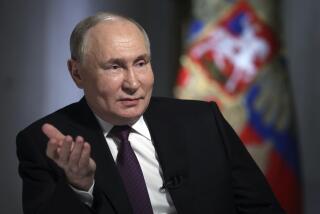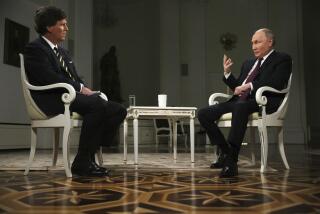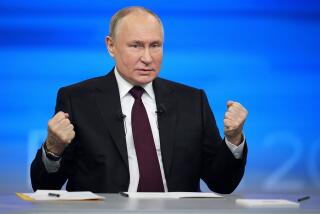Putin: ‘External factors’ are to blame for plunging Russian economy
Russian President Vladimir Putin blamed “external factors” for the plunge in his country’s economy, but said it would bounce back within two years even “under the most unfavorable circumstances.”
Speaking at his annual news conference Thursday, Putin was typically defiant, defending the annexation of Crimea, downplaying Russia’s role in the armed conflict in eastern Ukraine and blaming the West for the deterioration of relations between Russia and NATO countries.
Putin insisted, as he has before, that the West had begun to build “new walls” around Russia almost as soon as the Berlin Wall fell in 1989.
Speaking for more than three hours to 1,000-plus journalists at the International Trade Center in Moscow, Putin aimed his remarks primarily at a domestic audience, trying to offer reassurance that the country’s grim economic situation was temporary.
Along with most analysts, he blamed falling oil prices and Western sanctions over Ukraine for the recent plight of the Russian ruble, which was at a record low earlier in the week.
“How soon will we adjust if the [oil] prices remain at today’s level or continue to go down?” Putin asked. “It doesn’t matter to us how long that may take, as we will be restructuring our economy. That is inevitable and I want to stress it.”
Putin took the blame for not having diversified much of Russia’s economy in the last two decades but argued that it was difficult to do so while oil prices were high, “as business tried to invest where it could get maximum and fast profits.”
The Russian leader praised the actions of his government and the Central Bank to control the crisis, and reminded the gathering that Russia still had $419 billion in its treasury and would be able to “cope with basic social issues.”
As he spoke, the ruble rose in value against the dollar.
Putin went on to say that “favorable conditions should be created for conducting business,” that “freedom should be provided for entrepreneurship and ... law enforcement organs shouldn’t be harassing everyone they don’t like.”
Western business leaders and economists have criticized Russia for its failure to establish the rule of law, which has been a major barrier to creating a culture of entrepreneurship.
Putin has repeatedly made similar assurances over the years, without significant changes in policy. However, the Kremlin sent a signal to the business community on Wednesday when Vladmir Yevtushenkov, a leading Russian tycoon, was freed from house arrest.
Yevtushenkov’s Sistema company had purchased Russia’s last remaining private oil company, Bashneft, and he was under investigation for alleged financial improprieties in the deal. While he was being held, Bashneft was seized by the state.
In contrast to his largely positive messages on the economic front, Putin showed flashes of anger as he spoke about foreign affairs, accusing the West of acting aggressively against Russia.
“Didn’t they tell us after [the fall of] the Berlin Wall that NATO would not be expanding eastward?” Putin exclaimed. “But they started doing it immediately. What is it if not a wall? And the ABM [Anti-Ballistic Missile system] next to our borders? Is that not a wall?”
“I think that our fairly tough position on the known crisis situations, including Ukraine, must make it clear to our partners that the most correct way is to stop erecting these walls but to start building a common humanitarian space, a space of security and economic freedom,” Putin said. He went on to accuse the West of trying to chain the Russian bear and “pull out its fangs and claws.”
“That is why it is not about Crimea,” Putin concluded, referring to the Ukrainian peninsula annexed by Russia earlier this year. “The fact is that we are protecting our independence, our sovereignty and our right to exist. This is what we all should understand.”
Putin refused to acknowledge the presence of Russian regular troops and army hardware in eastern Ukraine, where conflict between the Ukrainian government and highly armed separatists has claimed more than 4,700 lives.
“All the [Russian] people who fulfill their duty at the call of their heart, or voluntarily take part in some combat actions including eastern Ukraine, are not mercenaries because they are not paid for it,” he said. “The way our public sees it today, it is the current Kiev authorities which are conducting a punitive operation in Ukraine’s southeast.”
Putin insisted that Russia was delivering only humanitarian aid to the region and that the conflict should be resolved solely by political means. Ukraine has accused Russia of arming separatist forces and sending its troops over the border to assist them, a claim that has been backed by Western intelligence.
Before Putin spoke, a poll showed that he continues to command overwhelming support in Russia. The poll by Associated Press and the NORC Center for Public Affairs Research, indicated that 81% of Russians continued to support him, despite the country’s economic woes.
Putin reiterated that he was still very popular. Asked by a reporter about the possibility of “a palace coup,” he said it was impossible.
“I think you won’t argue with me that along the main line of foreign and home politics we enjoy such support,” Putin said. “It is because people in their souls and hearts feel that we — including myself in particular — are acting in the interests of an overwhelming majority of citizens of the Russian Federation.”
More to Read
Start your day right
Sign up for Essential California for news, features and recommendations from the L.A. Times and beyond in your inbox six days a week.
You may occasionally receive promotional content from the Los Angeles Times.






